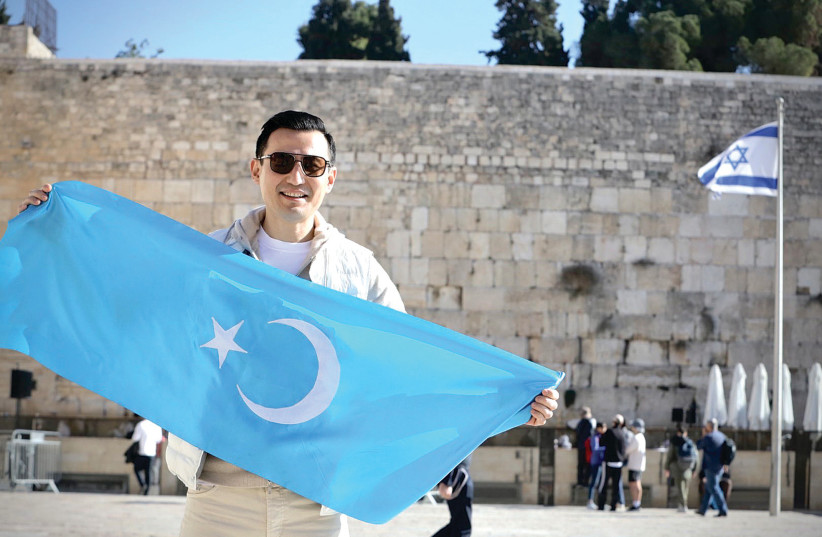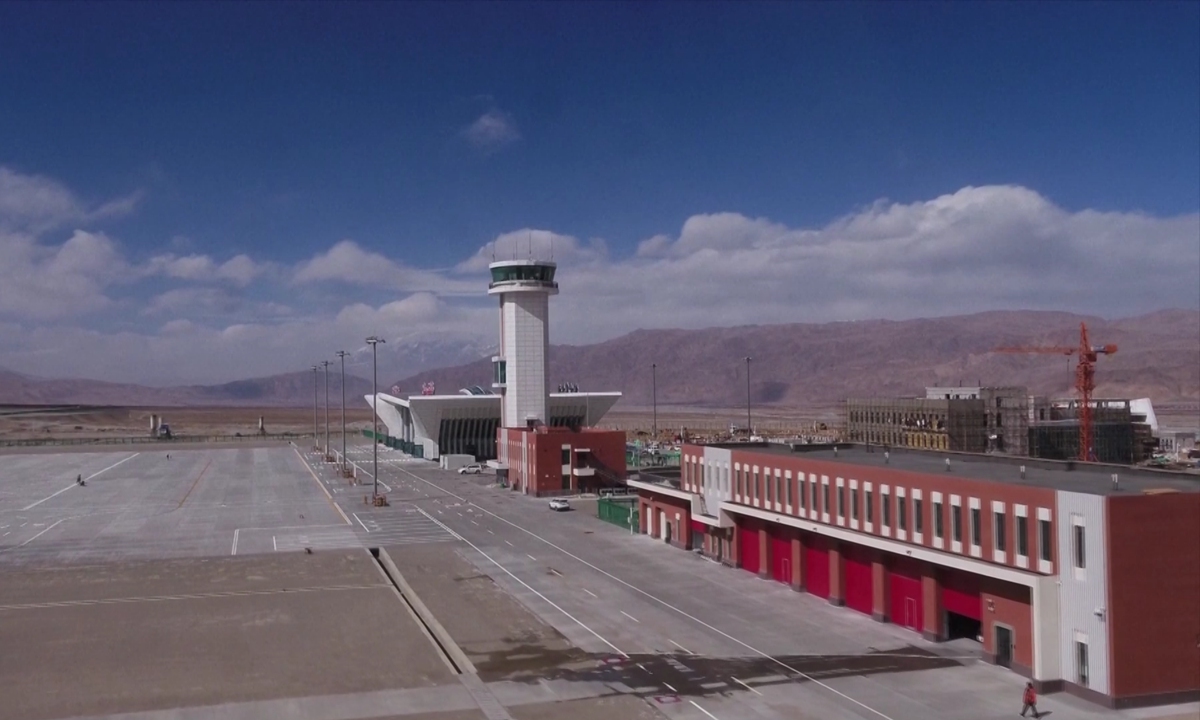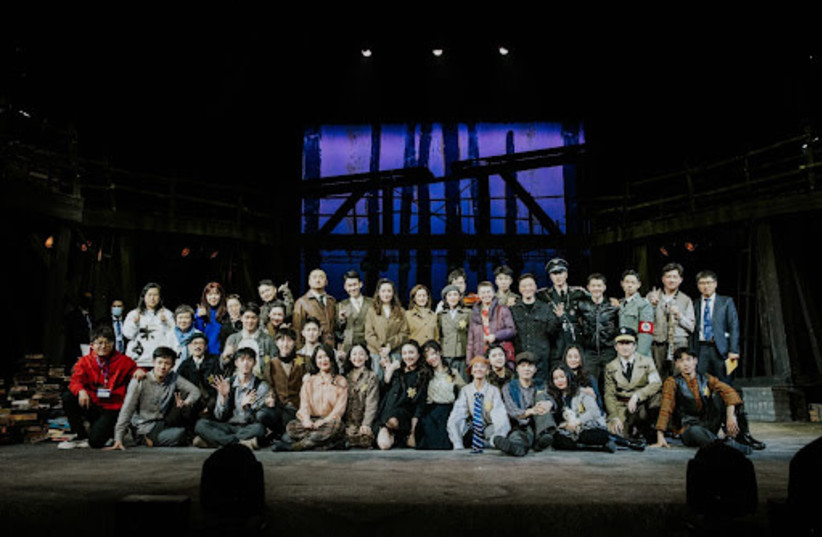Uiguren- zwischen Holocaust und Airport
Nachdem es um die Uiguren ziemlich still wurde in den Medien und der internationalen Gemeinschaft, die vielgespriesene muslimische Ummah und Solidaritätsgemeinschaft der Muslime ein Totalausfall ist, ja die meisten muslimischen Staaten die Uiguren nicht unterstützen, ja sogar viele lieber geopolitische und geschäftsbrngende Kontakte mit der KP China haben und andere wie Pakistan oder Saudiarabien oder zuletzt eine Delegation sunnitischer Geistlicher in Xinjiang die Repressionspolitik der KP China sogar offen unterstützen und gutheißen, zumal auch manchmal mit dem Hinweis der Bekämpfung des Islamismus oder gelungener Arbeitsfortbildungsmaßnahmen und Integrationsmodelle , versuchen nun Uigurenvertreter ihr verzweifeltes Glück in Israel, jenem angbelichen Naturfeind aller Muslime. Zum einen, um dieses als Fürsprecher zu gewinnen, dass es sich bei der chinesischen Massenrepression um einen Genozid und Völkermord handle, ja einen neuen „Holocaust“, wenngleich man betont, man wolle damit nicht die Schrecken der Shoa relativieren wie dies nun woke postkoloniale, postmoderne genderqueerfeminismuslinke mittels BDS- Unterstützung und Kategorisierung Israels als „Apartheidstaat“ und Kolonialismusprojket weißer Männer samt Gleichstellung der Opfer des industriellen Massenmords des Holocaust als Einzigartigkeit mit den Opfern des europäischen Kolonialismus tun. Desweiteren will man sich auch Inspiration holen, wie man diesen Kampf gegen einen „Genozid“ durchsteht, am besten führt und da gilt das Motto. Von Israel lernen heißt siegen lernen!“., um eines Tages wieder in ein gelobtes Ostturkestan oder Xinjiang zurückzukehren, aus dem einen Pharao Xi vertrieben hat.
„What can the Uyghurs learn from Israel?
WORLD AFFAIRS: President of the Uyghur American Association visits Israel and has some interesting observations to share

Kuzzat Allay visits the Western Wall this week.
(photo credit: Courtesy)
Kuzzat Altay’s tale will sound familiar to many Jews.
Persecuted in his homeland, imprisoned at one point, ostracized by friends and schoolmates, he emigrated and – after a circuitous route – ends up as a refugee in America, joining an aunt already there.
He arrives in the US without knowing English, but with a wife and a 10-month-old son. He lives off of food stamps while working first at a restaurant, then at a grocery store, then as an Amazon delivery man. Eventually, he learns a trade (writing computer code), excels at it, becomes a successful entrepreneur and starts a tech-education business of his own that employs hundreds and serves thousands.
He doesn’t forget where he came from or his people suffering thousands of miles away, and he devotes time, energy and money to their cause.
Altay is not a Jew who left Russia for the goldene medina at the turn of the 20th century; instead, he is a Muslim Uyghur who left China and ended up in Fairfax, Virginia, at the beginning of the 21st century. Ever since he has dedicated himself to growing his business – he is the founder and CEO of a tech education company called CYDEO that runs what he calls “coding boot camp” to train students in computer programming skills in six-to-10-month programs – and to raise awareness of the Chinese persecution of its Muslim Uyghur minority.
It is the pursuit of both goals that brought Altay to Israel this week.
“One day in 2018 my dad left me a voice message, and said that they are taking him,” Altay – speaking in flawless English – said during an interview in the lobby of Jerusalem’s Waldorf Astoria Hotel. “I was, like, ‘where are they taking him?’ He just disappeared.”
Altay thought his father – who lived in Urumqi in the northwestern Xinjiang Uyghur Autonomous Region – would be back in a week or two. He was wrong, he did not hear from him again for two years.
“One day someone texted me, sent me a Twitter link and asked if this was my dad,” remembered Altay, who had become president of the Uyghur American Association (UAA) in the interim. “I clicked on the link, and saw my dad on a bed saying that he is the father of Kuzzat Allay, the president of the UAA. He said, ‘son, stop doing anything bad against our government, our party is treating me really well. If you continue doing this stuff, I will denounce you as my son. I will have no son like you.’”
Who are the Uyghur Muslims in China?
THE UYGHURS are a minority of 12 million predominantly Muslims living primarily in the Xinjiang Uyghur Autonomous Region, an area Altay calls East Turkestan. They speak their own Turkic language, Uyghur, written in a Perso-Arabic script. The US, UK, Canada and Netherlands have accused China of committing genocide against the Uyghurs, defined according to an international convention cited in a recent BBC report as “intent to destroy, in whole or in part, a national, ethnical, racial or religious group.”
According to this BBC report from May, which was based on leaked police documents, almost 23,000 residents – or more than 12% of the adult population of one Xinjiang county – were in a camp or prison in the years 2017 and 2018. If applied to Xinjiang as a whole, the report said, the figures would mean the detention of more than 1.2 million Uyghur and other Turkic minority adults in these concentration camps, facilities the Chinese government calls – in Orwellian terms – re-education camps.
Survivors of those camps have spoken of torture, forced sterilization, rape and the use of inmates as slave labor.
What had Altay done to incur the wrath of the Chinese Communist Party, whom he said obviously forced his father to make that statement disavowing him? He became heavily involved with the small Uyghur community in the US, founded in Fairfax – a Washington suburb – the first Uyghur community center as a hub for community organizing, political lobbying and cultural education, and became involved in getting Congress to pass two bills dealing with the Uyghurs – the Uyghur Human Rights Policy Act and the Uyghur Forced Labor Prevention Act – all moves that infuriated the Chinese government.
“When I saw my father on Chinese national TV I was mesmerized,” Altay said. “I didn’t know if I should be happy to see my dad alive, or sad that he was denouncing me on national TV. I was, of course, very happy that he had been released – I hadn’t heard from him for two years. I literally thought he was killed.”
Rather than deterring him from further involvement with the Uyghur community in the US and further political action on their behalf, Altay said this spurred him on.
“I was, like, fantastic – this is working,” he said.
Altay surreptitiously got a message to his father telling him that the Chinese do not gain anything by killing a man nearly 70 years old, but that they “give him a cause that I will use in every international forum as leverage. I didn’t know if my father would get this message, or whether they would kill him, but I know that if you don’t speak up, many others will be killed.”
The activities of Uyghurs speaking up abroad, he said, made the Chinese government realize that there are consequences for its actions.
“I think the reason that [Chinese President] Xi [Jinping] started the concentration camps is that he was overconfident. He didn’t think that the world would do anything because it needed China, that this was not the old China, but rather a superpower. He is the supreme leader of a superpower so he feels he could do whatever he wanted. He got too arrogant. “
“I think the reason that [Chinese President] Xi [Jinping] started the concentration camps is that he was overconfident. He didn’t think that the world would do anything because it needed China, that this was not the old China, but rather a superpower. He is the supreme leader of a superpower so he feels he could do whatever he wanted. He got too arrogant. “
Kuzzat Altay
Inspired by The Prince of Egypt: Xi Jinping as pharaoh jumping into the Red Sea
Altay said he was inspired as a kid by the Chinese-dubbed DreamWorks adaption of the Exodus story, The Prince of Egypt, and that one thing that struck him was that no one dragged Pharaoh to the Red Sea in pursuit of the Hebrews; instead, he went of his own accord.
“He was excited, overcome and said he would chase after Moses. He was the one jumping into the sea. He killed himself; I think dictators have similar tendencies. It doesn’t make sense what Xi is doing. He is jumping on his own; no one is pushing him. He got overconfident locking up millions of Uyghurs. He thought he could get away with it.”
What he did not calculate, Altay said, was the international Uyghur community. “Despite their small numbers [estimates of the numbers in the US range from 10,0000 to 30,000], despite family members being kidnapped in China if those abroad speak out, despite less than 1,000 people speaking out in the world, we were effectively able to get the world to believe that there was a genocide going on, and to pass bills that have a had a huge impact on the Chinese economy.”
Many Uyghurs abroad, he said, are afraid of getting involved because they are afraid that their relatives at home will face retribution. “Many people are so scared of even contributing money because they fear it would get their families in China in trouble.”
Asked if that meant Chinese intelligence officials were monitoring the community in Fairfax, he said, “the Chinese intelligence is not in Fairfax, Virginia; it is in your brain. They [the Uyghur] are educated in a Chinese Communist environment so that it will follow them. If you go to Mecca, if you go to Virginia, if you go to Brooklyn, New York. It’s with you, so you can’t take it out.”
ONE PARTICULAR US bill that has made a difference is the Uyghur Forced Labor Prevention Act, which makes it mandatory for companies making products in Xinjiang to verify that slave labor was not being used in the production process.
“That bill made a difference,” he said. “Everything is now suspected of having been made using slave labor unless proven otherwise. It makes doing business in China difficult because if you are Nike or Adidas, you do not want to go through this crazy process to prove that slave labor was not used for your product.”
No one can understand the Uyghurs better than the Jews
The world, he said, is waking up to China’s abuses, but it has not been an easy process.
“Just a few years ago, people were skeptical when we mentioned what was happening. But why would I lie that my dad is in a concentration camp? Why would I lie about genocide? People automatically suspect that something is wrong with you.”
One notable exception, he said, was the Jewish community. “When we spoke to the Jewish community, nobody was trying to prove we were lying or exaggerating, but said, what can we do?
“One of the reasons we are in Israel is because I believe that no one can understand us better than the Jewish people,” he said.
“When we spoke to the Jewish community, nobody was trying to prove we were lying or exaggerating, but said, what can we do? One of the reasons we are in Israel is because I believe that no one can understand us better than the Jewish people.”
Kuzzat Altay
Since most Muslim countries have close business ties with China, they have not been supportive and even disputed widespread persecution claims of the Uyghur. Altay took to Twitter earlier this month to criticize Saudi Arabia when Xi was given an honorary degree during a visit there.
“I am Muslim, and I am having a hard time explaining the situation to the Muslim people – imagine that,” he said. “Any Jewish person I talk to, when we mention the concentration camps and what is going on – that they took our elites first, our academicians, our scientists, and then the second layer – when we describe this, immediately you see recognition and compassion. I feel that automatically nobody can understand us better than you.
“Even though you went through the Holocaust, you have a successful nation that is advancing, that is advancing technology, advancing democracy and the rule of law, and becoming an example for the world. Our land in East Turkestan is three times bigger than Turkey, and I believe we are 20 million people. When we look at the few million people here, it is like, how can we learn from this nation that was able to get through this Holocaust and rebuild itself? I think this is something that the Uyghurs need to look up to and learn from.”
https://www.jpost.com/israel-news/article-725614
Die Uiguren versuchen ja gerade Israel als Fürspecher in Sachen Genozid und anderem zu gewinnen.Ganz interessant ist nun zum Internationalen Holocaustgedenktag,dass in Zusammenarbeit mit China in Peking nun das israelische Theaterstück Ghetto in einer chinesischen Version aufgeführt wird-bezeichnenderweise in Kooperation mit der israelischen und deutschen Botschaft.Ob man hofft,dass die Chinesen nicht die Parallele zu den Uiguren oder anderen Minderheiten sehen.Aber wahrscheinlich halt sich dieZahl der Besucher auch in Grenzen und wird nicht grosser darüber berichtet.Aber in der Jerusalem Post, zumal als Artikel des Aussenministeriums:
„Chinese version of Israeli play Ghetto staged in Beijing

(photo credit: Embassy of Israel in China)
To mark International Holocaust Remembrance Day, which is observed on January 27, the Chinese production of “Ghetto,” an Israeli play that tells the story of the Vilna Ghetto during the Nazi occupation in World War II, was staged at the Poly Theater in Beijing on January 11 and 12.
The performance was jointly supported by the Israeli and German embassies in China to mark International Holocaust Remembrance Day. A number of foreign diplomatic envoys were in attendance, including H.E. Irit Ben-Abba and H.E. Patricia Flor, the Israeli and German ambassadors.
The play was the first in-depth cooperation between Chinese and Israeli theater teams and is a milestone in the exchanges between the Chinese and Israeli theater circles.
(credit: Embassy of Israel in China)
“Ghetto” was first performed at the Haifa Theatre in Israel in 1984, has since been staged in over 25 countries, including Germany, Britain and the United States, and has been translated into 20 languages. The Chinese adaptation premiered in China in 2018 to wide acclaim.
Anais Martane, the French-Jewish photographer and spouse of Chinese actor Liu Ye, brought the play to China, and was the lead actress and co-producer of the Chinese adaptation of the play.
Directed and written by Israeli playwright Joshua Sobol, the play is based on the true story of a theatre that operated in the Jewish ghetto of Vilna during the darkest days of the Holocaust.
“We were surprised to learn that records exist of people coming to the theatre and paying for shows during the Nazi occupation in World War II,” Martane said. Records indicate that every performance played to a full house during a period when people had little food to eat, she added. Most audiences felt the strength of life through the story, she explained.
“I think that presenting this show in China is very important, because it will help Chinese audiences learn about the history of the Jewish people, the Holocaust, and World War II,” said Erez Katz Volovelsky, spokesperson of the Israeli embassy in China. He added that it is important for the younger generation to become familiar with these historical events.
This article is powered by Ministry of Foreign Affairs
https://m.jpost.com/365days/-theatre/article-733196
Ich kenne einen irakischen Christen,der Theaterregisseur in Badgad war und mit berichtete,dass unter Saddam Hussein auch Stücke von Berthold Brecht aufgeführt wurden.Das wunderte mich etwas,da diese ja etwas Subversives haben. Aber vielleicht interpretiert in Richtung Baathideologie des panaranischen Sozialismus mit dem allesumfassenden Ideal der sozialen Gerechtigkeit und dem Brechtschen „Erst kommtdas Fressen, dann die Moral“ im Sinne der wirtschaftlichen Entwiklungsrechte vor allen Freiheitsrechten, Menschenrechten, ja soziale Entiwcklung ist dann das erste Mesnchenrecht und alles später oder nie in einer darauf aufbauenden Bedürfnispyramide, die vom Westen aufgrund fortgeschrittener ökonomischer Entwicklung als Luxussahnehäubchen der Frauen-, Tierschutz und LGBTIQrechte partikularisiert und entwicklet wird, aber eben eher eine Art Gendergap zum Global South hervorbringt,
Ein deutscher Chinaexperte meinte darauf
„Chinesisches Gegenwartstheater hat sehr viel Subversives. Meine Assistentin, die leider jetzt woanders ist, arbeitet darüber seit vielen Jahren, und so habe ich eine Reihe Regisseure (-innen) kennengelernt. Das sind alles sehr kritische Geister. Aber ich denke die Parallele zu den Uiguren ist etwas, an das nur Westler denken, weil die Chinesen darüber kaum etwas wissen oder es auch so nicht glauben, wie es bei uns beschrieben wird. Traf neulich eine Chinesin, die mit einem Deutschen verheiratet ist (recht hochrangig, nun pensioniert), die völlig entsetzt sagte, es gebe doch hier wirklich Leute, die glaubten, das Corona-Virus stamme aus Wuhan. Ich war lange nicht mehr in China und weiß nicht, was die Leute wissen und denken, aber ich könnte mir vorstellen, dass die Mehrheit auch nicht glaubt, dass Wuhan der Ursprung ist.
So einen großen Unterschied macht es, wenn die Medien etwas berichten bzw. nicht berichten oder etwas ganz anderes berichten. GT ist gut, aber es ist eine englischsprachige Zeitung, die für das Ausland da ist. Die Chinesen lesen anderes.“
Nachdem bei der UN-Menschenrechtskonferenz Xinjiang kurz erwähnt wurde, antwortet die Global Times mit zwei Artikeln. Zum einen mit Regionalstorys von glücklichen Uiguren mit lauter netten und frühlichen Propagandaphotos der Gemeinschaft aller chinesischen Völker. .Zum anderen mit einem Artikel, wonach Xinjiang scheinbar zu einem Riesenflughafen Drehkreuz für Cargotransporte für Zentralasien und Europa ausgebaut zu werden scheint, als auch für den Inlandverkehr im Rahmen des Go West und Neuen Seidenstrassenprojekts. Will man so die durch den Ukrainekrieg und Meloni- Italiens unterbrochene Seidenstrasse zu Land und See nun zu Luft kompensieren?
“New airport constructions in Xinjiang region resume
By Global Times Published: Mar 17, 2023 02:01 PM

Photo: CFP
By the end of 2023, the number of airports in Xinjiang region will reach 27 with the completion of Qitai Airport and Bayanbulak Airport, according to a CNR report.
By the end of the 14th Five-Year Plan (2021-2025), the number of airports in Xinjiang region will reach 33, and the density of airports in Xinjiang region will reach two airports in every 100,000 square kilometers.
In 2023, seven branch airport construction projects will start, according to Xinjiang Airport Group, among which include the expansion project of Kashi Airport and the new airport project of Bugur (Luntai).
So far, the expansion project of Kashi Airport and the construction of the new project of Qitai Airport have started. Due to the regional temperature, the construction of Bayanbulak Airport and Barkol Airport is expected to resume at the end of March.
The new construction project of f Bugur (Luntai) Airport and the reconstruction and expansion projects of Karamay and Nalati Airport are at the stage of feasibility report approval. It is expected that the preliminary work will be completed and the construction will start in the second half of the year.
The logistics resources of airports in Xinjiang region will be further integrated to promote the construction of aviation logistics parks, and the Xinjiang Airport group will expand domestic and international cargo routes and develop chartered cargo flight services and international air logistics services in Eastern Europe, Central Asia and other regions, the Xinhua News Agency reported, citing Xinjiang Airport Group.
At least four international passenger air routes will be opened or resumed, and over two domestic and foreign airlines will be introduced to operate scheduled flights this year. In addition, about 18 air routes within Xinjiang and between cities in Xinjiang region and other provinces will be opened, the Xinhua report said.
https://www.globaltimes.cn/page/202303/1287474.shtml
Chinaexperte Professor van Ess kommentierte die jüngste Entwicklung vor allem mit Hinblick auf die innere Entwicklung:
„Kashgar liegt traditionell an der Seidenstraße und näher an Mekka als an Peking. Insofern keine dumme Idee. Es geht sicher nicht nur um internationalen Verkehr, sondern auch um die Erschließung Xinjiangs, wo ja Fortbewegung lange Zeit ein großes Problem darstellte. Man brauchte ewig von Urumqi nach Kashgar.“
Ob es dann auch Direktflüge nach Israel und nicht nur Mekka und Peking gibt?
